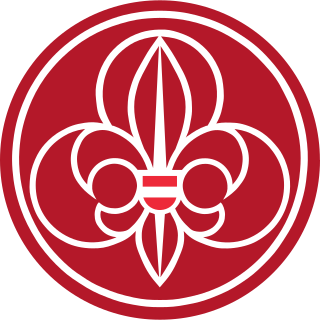
Pfadfinder und Pfadfinderinnen Österreichs is the largest Scouting and Guiding organization in Austria and the only one approved by World Association of Girl Guides and Girl Scouts (WAGGGS) and the World Organization of the Scout Movement (WOSM). The association claims more than 300 troops with more than 85,000 Scouts nationwide. WOSM and WAGGGS give quite smaller membership values for the PPÖ: 27,274 members in WOSM and 10,508 members in WAGGGS.

The Ring deutscher Pfadfinderverbände was the German national Scouting organization within the World Organization of the Scout Movement (WOSM). It served 115,944 members.

The Ring Deutscher Pfadfinderinnenverbände was the German national Guiding organization within the World Association of Girl Guides and Girl Scouts (WAGGGS). It served 47,688 members.
The World Federation of Independent Scouts (WFIS) is a non-governmental international Scouting organization with over 7 million members in 151 affiliated Scout organizations in 65 countries. WFIS was formed in Laubach, Germany, in 1996 by Lawrie Dring, a British Scouter with the independent Baden-Powell Scouts' Association (BPSA).

The Scout movement in Germany consists of about 150 different associations and federations with about 260,000 Scouts and Guides.

The Swiss Guide and Scout Movement (SGSM) (German: Pfadibewegung Schweiz (PBS), French: Mouvement Scout de Suisse (MSdS), Italian: Movimento Scout Svizzero (MSS), Rumantsch: Moviment Battasendas Svizra (MBS)) is the national Scouting and Guiding association of Switzerland formed in 1987. Scouting was founded in Switzerland in 1912 and was among the charter members of the World Organization of the Scout Movement in 1922 and among the founding members of the World Association of Girl Guides and Girl Scouts in 1928. The SGSM has more than 50,500 members in about 550 local groups (as of 2022).

The Scouts of Namibia is the national Scouting organization of Namibia. It serves 2,845 Scouts.

Pfadfinder und Pfadfinderinnen Liechtensteins is the national Scouting and Guiding association of Liechtenstein. Scouting in Liechtenstein started in 1931, and Guiding followed in 1932. The Boy Scouts became a member of the World Organization of the Scout Movement in 1933, and the Guides joined the World Association of Girl Guides and Girl Scouts in 1952. In 1989 both organizations merged and formed the present Pfadfinder und Pfadfinderinnen Liechtensteins. The PPL has about 1,100 members of both sexes and is organised in ten troops.

Walther von Bonstetten was among the founders and most important members of the Swiss Boy Scout association Schweizer Pfadfinderbund, was elected President in 1918 and kept a leading role until 1942.
The Scout and Guide movement in Namibia is served by:

The Sturmtrupp-Pfadfinder was a Scout association in Germany active from 1926 to 1934. The association never had more than 500 members. It was the first Scout association in Germany to admit boys and girls. It was interdenominational and politically neutral.

The Deutsche Freischar – Bund der Wandervögel und Pfadfinder (DF) is a German youth organization. Originating from the merger of several small Wandervogel and Scouting groups, it was one of the largest and most important associations of the Bündische Jugend of the Weimar Republic besides the Deutscher Pfadfinderbund and Reichsschaft Deutscher Pfadfinder.
Alexander Franz Anton Lion was the co-founder of the German Scout Movement.

The Deutsche Pfadfinderverband is an umbrella federation of sixteen German non-denominational Scouting associations. It was founded in 1970 and serves about 29,000 members.
Wilhelm Teuber-Weckersdorf was an Austro-Hungarian officer and a Scouting pioneer in Austria, popularly known within the Scouting movement as "Willy Teuber" or "Onkel Teuber".

German South West Africa was a German colony in Africa, established in 1884 with the protection of the area around Lüderitz and abandoned during World War I, when the area was taken over by the British.

The Union of German Scouts in South West Africa, the first German oriented Scouting organization, was founded in 1928 in South West Africa and dissolved by the South African administration in 1939 on the outbreak of World War II. The current association, Deutscher Pfadfinderbund in Namibia, was founded in the 1960s, under the name Deutscher Pfadfinderbund Südwestafrika.

The Pfadfinderbund Weltenbummler e.V.(Scouts' Association Globetrotter) is an inter-confessional and apolitical German Scout association founded in 1981. It has about 2000 members and is part of the World Federation of Independent Scouts (WFIS), the Duke of Edinburgh's Award (DofE), the German Scout Association (DPV), the Bavarian Scout Council and the German Parity Welfare Association. It is recognized by German law as a charitable and nonprofit organization. The association is built on the principles constituted by Robert Baden-Powell. The scout uniform is dark blue; they wear black pants and striped neckerchiefs with varied woogles.

The Deutscher Pfadfinderbund (DPB) (literal translation German Scouting Union) was the first German Scouting association, and the forerunner of the Deutscher Pfadfinderbund (1945). It existed from 1911 until 1933, when it was disbanded by the National Socialists.

The Deutsche Pfadfinderbund Mosaik (DPBM) is the largest member of the Deutscher Pfadfinderverband (DPV). Like all Scout associations in DPV, it is interdenominational and politically independent. Its legal entity is the registered association Pfadfinder-Bundesamt in Cologne. The DPBM is recognized as a charitable organization and supports voluntary youth welfare nationwide.




















